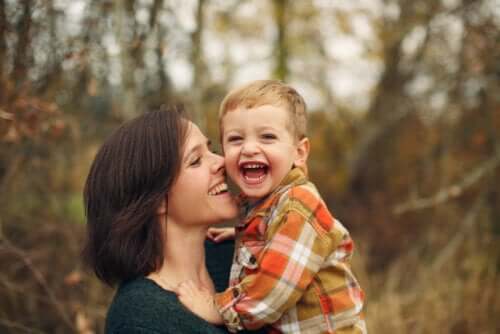Attachment Parenting Requires a Dose of Flexibility


Written and verified by the psychopedagogue María José Roldán
When you think of attachment parenting, you may think of cloth diapers, breastfeeding, and organic food. However, it involves so much more than that! Also known as natural parenting, attachment parenting focuses on responsiveness and awareness to meet your baby’s needs.
While many first-time parents intend to be 100% natural parents, many unexpected things will surely happen and alter their plan. It’s important to know why a mother or father defines themselves as a follower of this philosophy and has learned to be flexible in their child’s best interest.
Attachment parenting
In attachment parenting, what matters is being in constant growth and learning, adapting to situations, and learning from other parents. This way, you make sure you always do the best thing for your child, no matter what. Although you may like this parenting philosophy, you also need to have a realistic approach.
If you want to apply it, it’s important for you to be flexible and take some things into account. We’re going to discuss some of them so that you can apply them in your parenting from now on.

Attachment parenting and flexibility: Each situation and child requires different commitments
It’s easy to set rules and plans before facing the reality of a living baby who breathes, cries, and poops under your constant care. But that baby will need you to help them feel safe, loved, and secure, no matter what you have planned.
Maybe you were against your baby using a pacifier, but there’s nothing wrong with giving it to your baby when you can’t breastfeed them or for them to stop sucking their thumb.
It’s best for your child to feel calm and safe than to only meet the attachment parenting expectations at all costs. In the case of pacifiers, for example, your baby will stop using it as soon as they feel secure enough without it.
Also, it’s possible for you to allow your child to spend more time watching television, considerably more time than you thought you’d allow them to. In addition, you may have started parenting with cloth diapers. However, when you have three children, for example, you may not be as interested in this anymore and prefer disposable diapers. This is okay. As such, you don’t have to feel bad about it.
With time, you may become aware of the groceries you have to buy so that your little ones have a good diet. You possibly may continue buying organic products but what matters is that you do all the things you do for the sake of your children. If your children need medical attention and medication, it’s irresponsible to deny it to them due to an ideology.
You can follow some of this philosophy’s guidelines
Even if your attachment parenting is more flexible, you can follow certain guidelines that are non-negotiable for you. For example, you may avoid allowing your baby to cry just so they learn to sleep alone. This is okay because your little one needs your love and warmth.
Also, you can be against punitive discipline, and that’s okay. Remember that children need parents who understand and respect them above all else. Similarly, if you want to breastfeed your baby for as long as you want, you can also do it, no matter what anyone says.
On the other hand, it’s also fine if you can’t breastfeed, meaning you have to feed your baby formula or complement the breastfeeding with bottle feeding. You’ll be doing what’s best for your baby!
Never embarrass, belittle, or mistreat your children. This is exactly what they don’t need. Intuition is very important in attachment parenting. In this regard, remember certain non-negotiables that your children need to grow up in a good environment full of love and affection with parents who care and worry about them at all times. They need to feel safe in their family.
If you’re doing your best with your children, then you should know that you’re doing the right thing. The best way to help anyone else is by setting an example. Let your experience with certain parenting styles speak for itself.
When you think of attachment parenting, you may think of cloth diapers, breastfeeding, and organic food. However, it involves so much more than that! Also known as natural parenting, attachment parenting focuses on responsiveness and awareness to meet your baby’s needs.
While many first-time parents intend to be 100% natural parents, many unexpected things will surely happen and alter their plan. It’s important to know why a mother or father defines themselves as a follower of this philosophy and has learned to be flexible in their child’s best interest.
Attachment parenting
In attachment parenting, what matters is being in constant growth and learning, adapting to situations, and learning from other parents. This way, you make sure you always do the best thing for your child, no matter what. Although you may like this parenting philosophy, you also need to have a realistic approach.
If you want to apply it, it’s important for you to be flexible and take some things into account. We’re going to discuss some of them so that you can apply them in your parenting from now on.

Attachment parenting and flexibility: Each situation and child requires different commitments
It’s easy to set rules and plans before facing the reality of a living baby who breathes, cries, and poops under your constant care. But that baby will need you to help them feel safe, loved, and secure, no matter what you have planned.
Maybe you were against your baby using a pacifier, but there’s nothing wrong with giving it to your baby when you can’t breastfeed them or for them to stop sucking their thumb.
It’s best for your child to feel calm and safe than to only meet the attachment parenting expectations at all costs. In the case of pacifiers, for example, your baby will stop using it as soon as they feel secure enough without it.
Also, it’s possible for you to allow your child to spend more time watching television, considerably more time than you thought you’d allow them to. In addition, you may have started parenting with cloth diapers. However, when you have three children, for example, you may not be as interested in this anymore and prefer disposable diapers. This is okay. As such, you don’t have to feel bad about it.
With time, you may become aware of the groceries you have to buy so that your little ones have a good diet. You possibly may continue buying organic products but what matters is that you do all the things you do for the sake of your children. If your children need medical attention and medication, it’s irresponsible to deny it to them due to an ideology.
You can follow some of this philosophy’s guidelines
Even if your attachment parenting is more flexible, you can follow certain guidelines that are non-negotiable for you. For example, you may avoid allowing your baby to cry just so they learn to sleep alone. This is okay because your little one needs your love and warmth.
Also, you can be against punitive discipline, and that’s okay. Remember that children need parents who understand and respect them above all else. Similarly, if you want to breastfeed your baby for as long as you want, you can also do it, no matter what anyone says.
On the other hand, it’s also fine if you can’t breastfeed, meaning you have to feed your baby formula or complement the breastfeeding with bottle feeding. You’ll be doing what’s best for your baby!
Never embarrass, belittle, or mistreat your children. This is exactly what they don’t need. Intuition is very important in attachment parenting. In this regard, remember certain non-negotiables that your children need to grow up in a good environment full of love and affection with parents who care and worry about them at all times. They need to feel safe in their family.
If you’re doing your best with your children, then you should know that you’re doing the right thing. The best way to help anyone else is by setting an example. Let your experience with certain parenting styles speak for itself.
This text is provided for informational purposes only and does not replace consultation with a professional. If in doubt, consult your specialist.








